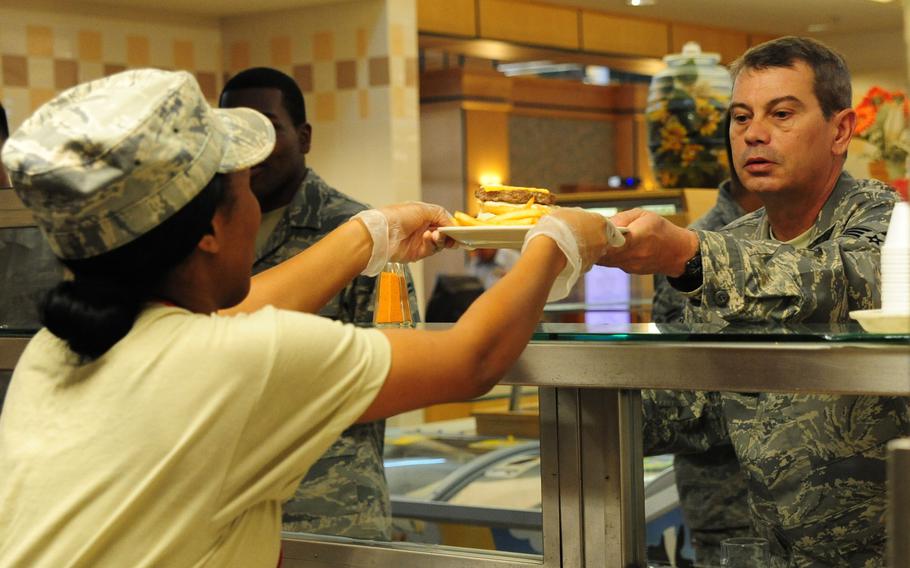
Airman 1st Class Ashli Green of the 628th Force Support Squadron hands an airman a plate at the dining facility at Joint Base Charleston, S.C., in 2012. (Chacarra Walker/U.S. Air Force)
WASHINGTON — The U.S. military is upping the amount of money that troops get every month to buy food, and the increase is the largest in two decades.
The monthly food allowance for active-duty troops will rise by 11%, according to the Defense Finance and Accounting Service. Most enlisted service members will receive almost $453 monthly, and officers will get about $312.
The increase, the largest since 2001, will take effect Jan. 1.
Most enlisted personnel will get roughly an extra $45 per month, and officers about $31. The class of enlisted service member known as BAS II will see an increase from about $814 to about $905. BAS II troops are those assigned permanently to single government quarters that do not provide sufficient food.
The allowance bump comes at a time of higher, but slowing, inflation in the United States that has resulted in more expensive necessities for families, such as food and gasoline. The Labor and Commerce departments have said the ongoing inflationary arc is mainly the result of the coronavirus pandemic.
Russia’s war in Ukraine also has affected world energy markets and global supply chain problems have made certain products harder to buy.
The Defense Department has said the allowance is intended only to offset food costs for service members, not members of their family. Consequently, some military households are still struggling to pay for food. According to a Pentagon study earlier this year, almost 25% of active-duty troops had faced some degree of food insecurity during 2021.
Sergeant Major of the Army Michael Grinston said, in those cases, families can sign up for other federal assistance, such as the Supplemental Nutrition Assistance Program, or SNAP.
“Many soldiers are not aware of these resources,” Grinston, the Army’s most senior enlisted member, said in August. “Via online tools, phone calls with personal financial counselors and visits to the local installation Army Community Service Center, help is just a click, call or a walk away, and there's no time like the present to get started.”
Each year, the Defense Department looks at the Agriculture Department’s food price index to determine whether troops need more money for food. The USDA’s most recent data states food prices rose by 10.9% for the 12 months ending in October. For 2023, the agency projected prices to rise another 3% or 4%.
Some advocates said while giving troops more money for food is always welcome, it really doesn’t hit at the root of the problem.
“More importantly than the allowance is making sure these dining facilities on [military] bases are places that people want to go,” said Steve Rossetti, president of the American Logistics Association, a nonprofit, Washington-based trade group of suppliers and manufacturers that provide services and products to the military.
Rossetti said many troops aren’t using their entire food allowance. The reasons are lack of convenience and lack of appeal with the dining options on base.
“It’s all about convenience, hours of operation. It’s all about the healthy dining options. It’s about giving people what they want,” he said. “And if they’re not using it, they lose it.”